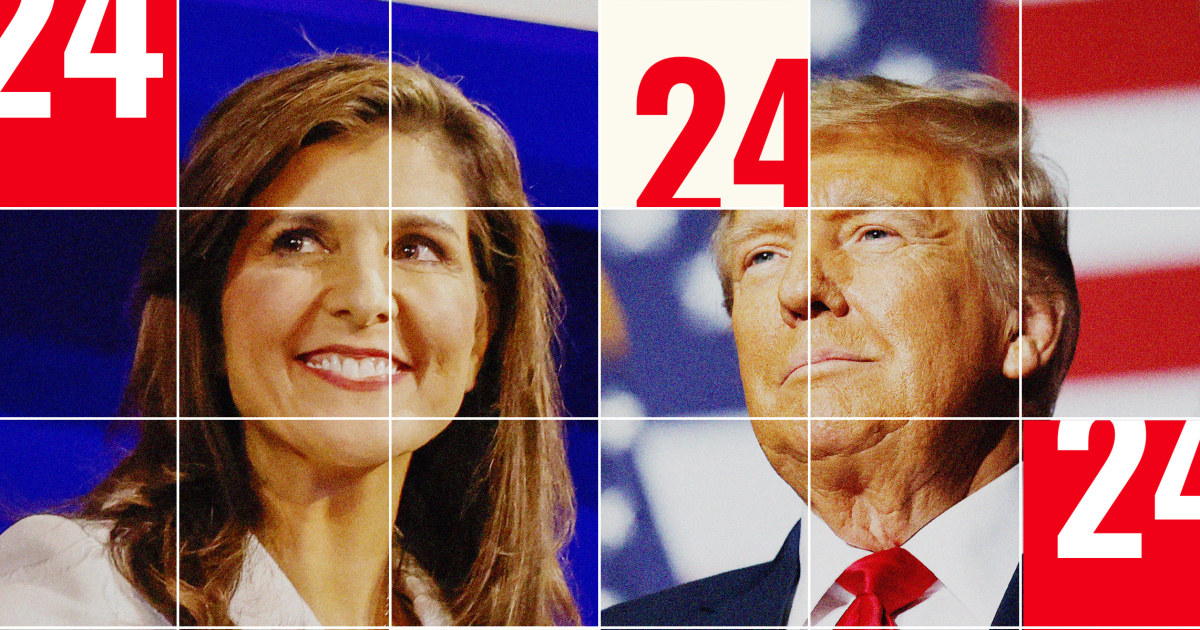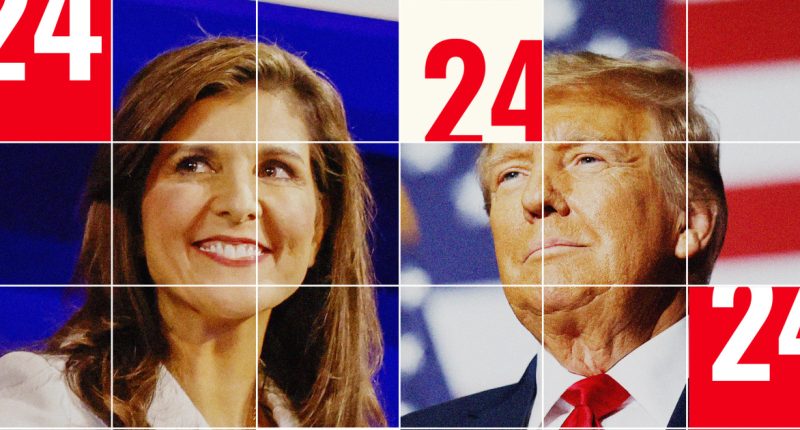
MANCHESTER, N.H. — Former President Donald Trump looked to take a giant leap toward the Republican presidential nomination — and a rematch against President Joe Biden — with a victory in New Hampshire’s primary Tuesday.
If he succeeds, it will put former U.S. Ambassador Nikki Haley, his lone remaining rival for the GOP’s 2024 presidential nomination, squarely behind the political eight ball as any candidate has ever been in a GOP nomination fight.
Follow live New Hampshire updates here.
Trump won Iowa’s caucuses last Monday, and Haley’s path to a comeback would be all but closed off by a defeat, particularly a convincing one, in New Hampshire.
“It seems to be getting late early, but tonight we’ll find out if this is the end or the beginning,” said Republican strategist Matt Mowers, who ran for Congress twice in New Hampshire.
“If Nikki Haley can keep it close, then she can convincingly argue to donors and voters that she should continue the long march to accumulate delegates” to this summer’s Republican convention, he said. “If not, Donald Trump may become the presumptive nominee even earlier than [President] Joe Biden.”
Trump is certain to win the Feb. 8 Nevada caucuses — which Haley will not participate in — before the race turns to her home state of South Carolina, where she was twice elected governor but trails the former president by dozens of points in public polling.
Trump headed into Tuesday’s voting, which began at midnight in Dixville Notch, with a lead that had gradually expanded in a Suffolk University/Boston Globe/NBC-10 tracking poll during a week in which the third competitor, Florida Gov. Ron DeSantis, dropped out of the race and endorsed Trump.
“If President Trump comes out strong tonight, that’s a clear message being sent by our primary voters,” Republican National Committee Chair Ronna McDaniel said in a statement to NBC News. “Another message we’re hearing is unity — from President Trump, Gov. DeSantis and Sen. [Tim] Scott [R-S.C.]. Republicans know that if we’re not united as a party behind our nominee we won’t be able to beat Biden.”
McDaniel noted that there’s never been “a Republican nominee who did not win at least Iowa or New Hampshire.”
On the Democratic side, President Biden chose not to file for the ballot, a decision consistent with his successful request that the Democratic National Committee tap South Carolina as the first state to count in his party’s nomination process. His allies hoped that he would win the Granite State as a write-in candidate against Rep. Dean Phillips, D-Minn., and self-help author Marianne Williamson.
But with Biden all but assured of coasting to the Democratic nomination, the real action is on the Republican side.
Though Haley swept all six votes Tuesday morning in Dixville Notch — a small hamlet closer to Montreal, Canada, than Manchester —Trump led her 60% to 38% in the final iteration of the Suffolk University/Boston Globe/NBC-10 survey, a spread that had grown by 6 percentage points in one week.
Haley insists that she can beat Trump in the one-on-one fight she now has on her hands — arguing that America is ready for a generational change from him and President Biden — and her campaign vowed early Tuesday that the battle would continue past New Hampshire no matter the outcome in the second state to vote.
Surveys showed Trump dominating Haley among registered Republicans in New Hampshire, with Haley boasting a smaller edge among the state’s sizable population of independent voters, who are allowed to choose a Republican ballot on primary day. Part of Haley’s argument is that many of the states, including 11 of the 16 that vote on Super Tuesday March 5, have primaries that allow independents to vote in GOP primaries.
“After Super Tuesday, we will have a very good picture of where this race stands. At that point, millions of Americans in 26 states and territories will have voted,” Haley campaign manager Betsy Ankeny wrote in a memo. “Until then, everyone should take a deep breath.”
Closing pitches
Trump spent the past week lobbying New Hampshire voters with one-a-day events across the state and at least one weekend tele-rally. His surrogates, including members of Congress and former rivals, fanned out to reach more voters in person and appeared on television and radio broadcasts.
In his final pitch to voters, in a cramped basement in Laconia on Monday night, Trump implied that an impressive margin in New Hampshire would set the stage for the general election.
“Get out of bed and just get to vote. Grab your neighbor, grab everybody. You gotta you, gotta go out because we have to win by big margins,” he said. “And the reason we have to do that [is] very simple. You know what the reason is: In November, we have to send the signal that we’re not playing games.”
He consistently hit Haley for wanting to raise the retirement age for Social Security and portrayed her as weak on border security.
After Republicans in the state complained that Haley had canceled debates, stopped taking audience questions at her events and booked a light schedule early in the week — her campaign explained that she had left New Hampshire for a weekly visit to her parents in South Carolina — she barnstormed like a candidate on a mission.
At a get-out-the-vote event in Salem on Monday, Haley told voters they are at a generational fork.
“This really is an option,” she said. “Do you want more of the same? Or do you want to go forward? … 70% of Americans have said they don’t want a Trump-Biden rematch. The majority of Americans disapprove of both Biden and Trump.”
She was able to secure the endorsement of New Hampshire Gov. Chris Sununu, who appeared in television ads for her. They both asserted that she would give Republicans a better chance of winning up and down the ballot in November, with Haley frequently pointing to surveys that show her faring better against Biden than Trump does.
The biggest little moment
With Trump refusing to debate anyone, and Haley declining to debate DeSantis last week if Trump didn’t participate, voters here were left without the chance to watch the candidates face off in person.
So, it was DeSantis’ abrupt decision to suspend his campaign Sunday that amounted to the biggest potential game-changer in the eight-day stretch between the Iowa caucuses and Tuesday’s primary.
For months, Haley and DeSantis had battled to a relative draw in their competition to become the lone serious challenger to Trump. By the time they reached New Hampshire, the rest of the candidates had dropped out. North Dakota Gov. Doug Burgum, businessman Vivek Ramaswamy and Tim Scott, who had previously exited the race, all campaigned for Trump.
After trying to convince his supporters that he could remain viable despite single-digit polling in New Hampshire — in part by visiting South Carolina repeatedly during the week — DeSantis traveled home to Florida and canceled all Sunday morning television appearances.
Instead, he met with advisers, including Rep. Chip Roy, R-Texas, at the governor’s Mansion in Tallahassee to assess his options. With his wife, Casey, he decided to end his bid, announcing his decision later in the day in a video in which he also endorsed Trump.
But his departure appeared to have little effect, given the small pool of voters who backed him.
Source: | This article originally belongs to Nbcnews.com








